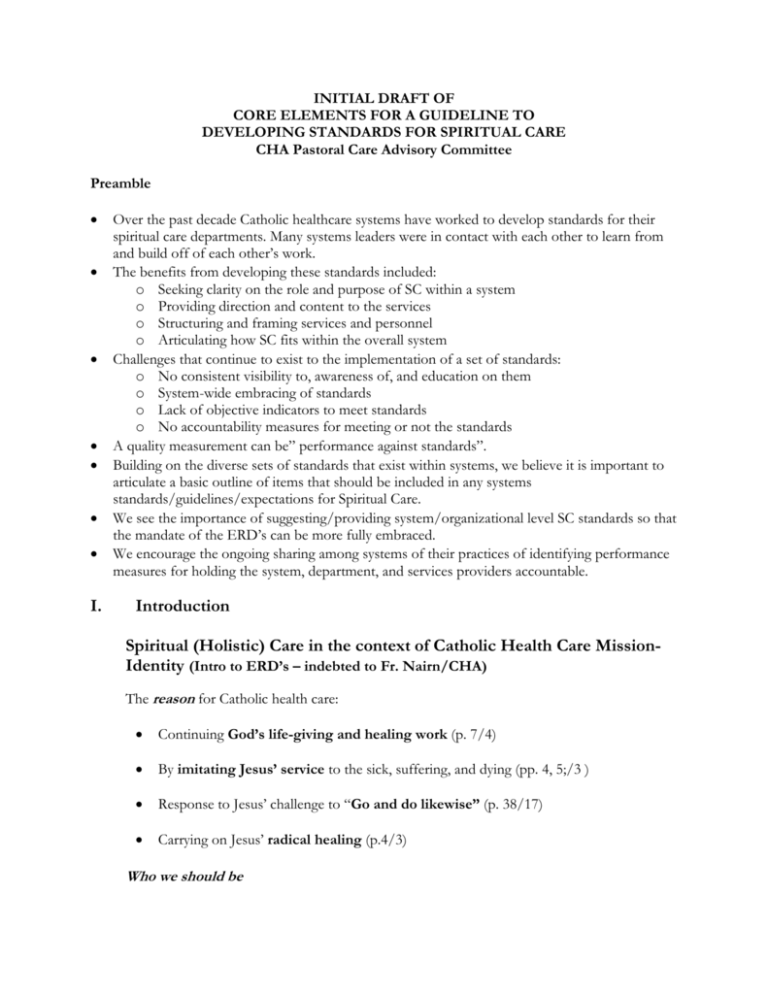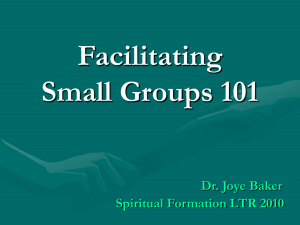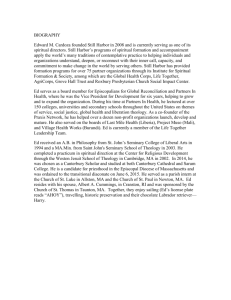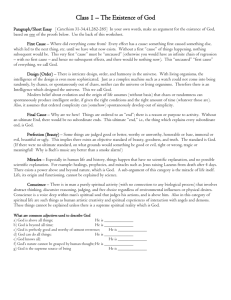Core Elements for a Guideline to Developing Standards for Spiritual
advertisement

INITIAL DRAFT OF CORE ELEMENTS FOR A GUIDELINE TO DEVELOPING STANDARDS FOR SPIRITUAL CARE CHA Pastoral Care Advisory Committee Preamble I. Over the past decade Catholic healthcare systems have worked to develop standards for their spiritual care departments. Many systems leaders were in contact with each other to learn from and build off of each other’s work. The benefits from developing these standards included: o Seeking clarity on the role and purpose of SC within a system o Providing direction and content to the services o Structuring and framing services and personnel o Articulating how SC fits within the overall system Challenges that continue to exist to the implementation of a set of standards: o No consistent visibility to, awareness of, and education on them o System-wide embracing of standards o Lack of objective indicators to meet standards o No accountability measures for meeting or not the standards A quality measurement can be” performance against standards”. Building on the diverse sets of standards that exist within systems, we believe it is important to articulate a basic outline of items that should be included in any systems standards/guidelines/expectations for Spiritual Care. We see the importance of suggesting/providing system/organizational level SC standards so that the mandate of the ERD’s can be more fully embraced. We encourage the ongoing sharing among systems of their practices of identifying performance measures for holding the system, department, and services providers accountable. Introduction Spiritual (Holistic) Care in the context of Catholic Health Care MissionIdentity (Intro to ERD’s – indebted to Fr. Nairn/CHA) The reason for Catholic health care: Continuing God’s life-giving and healing work (p. 7/4) By imitating Jesus’ service to the sick, suffering, and dying (pp. 4, 5;/3 ) Response to Jesus’ challenge to “Go and do likewise” (p. 38/17) Carrying on Jesus’ radical healing (p.4/3) Who we should be II. Ought to be Christ’s “healing compassion in the world” (p.38/17) Ought to restore and preserve health and serve as a sign of final healing (p. 38/17) As a ministry of the church (p. 6/4) The importance of spiritual and pastoral care (Part 2 ERD's pp. 12-13/6-7) 1. Catholic health care must treat all in a manner that respects human dignity and their eternal destiny; help others experience their own dignity and value. a. Along the continuum of life – resources are offered 2. Care offered must embrace the whole person: physical, psychological, social, and spiritual. a. Holistic model of care 3. Pastoral care is an integral part of Catholic health care. a. Thus the core elements for standards(expectations) that follow III. Organization/System Level 1. A system- organizational level plan in place for SC 2. System spiritual/pastoral care policy that states requirement for SC services and required SC facilities/space (Bon) 3. Education to all on spirituality in health care and role of SC 4. Education on the importance of and care for the spirituality of all staff/employees 5. Shared sensitivity to and shared responsibility for spiritual needs (Providence) a. Understanding that pastoral care as full range of spiritual services. (ERD) Listening presence Help in dealing with powerlessness, pain, etc. Assistance in discerning and responding to God’s 6. Organizational chart that includes SC with lines of responsibility (Several) 7. Well-Integrated into all services, facilities, etc. a. Listed as an integral part of all service lines b. Particular attention to SC delivery in non-acute settings, EOL, and high-acuity c. Importance of adaptability and flexibility of SC delivery by chaplains in a rapidly changing health care environment (e.g.EMR) 8. A spiritual care model includes responsibility of the whole staff in spiritual care (Prov) a. Basic spiritual support from all organizational staff Practice of core values Standards of behavior Service excellence b. Primary/Generalist spiritual care from RN, MSW, MD, CAN, etc. Therapeutic presence Active listening Spiritual screening Referral to SC c. Specialist Spiritual Care from SC department and BCC Spiritual Assessment Skilled interventions Care planning d. Clarity, education, accountability on each person’s respective role: III. Spiritual Care Department 1. 2. 3. 4. 5. 6. 7. 8. 9. IV. Has a strategic plan with goals/objectives integrated with organizational strategic plan A staffing model based on best practices, sufficiently staff to meet commitments Staffing composition reflecting diversity A qualified department leader meeting ERD #21, 22 directives Staff personnel with professional preparations and credentials with the full-range of competencies to meet patient/staff spiritual needs: i. Board certified chaplain ii. Pastoral Associates iii. Sacramental ministers – on call clergy iv. CPE supervisors v. Volunteers (STAR- selected, trained, authorized/accountable, resourced) Clear job descriptions, accountability structures and processes compliant with organization Partnerships with local churches and other faith communities Practices in place that include but not limited to the 13 SOP’s for Chaplains (APC): i. Assessment ii. Delivery of Care iii. Documentation of Care: iv. Teamwork and Collaboration: v. Ethical Practice vi. Confidentiality vii. Respect for Diversity viii. Care for Staff ix. Care for the Organization x. Chaplain as Leader xi. Continuous Quality Improvement: xii. Research xiii. Knowledge and Continuing Education Budget that is integral to system’s budget, and determined consistent with other professional cost centers in system Spiritual Care Delivery 1. Scope of Services i. Clear, visible communication of scope of services ii. 24/7 coverage iii. Tending to spiritual, emotional needs 2. Collaboration and Relationships i. A BCC is an integral, active member of the interdisciplinary care to review/determine care delivery ii. A BCC as part of the Ethics Committee. iii. Orientation of all employees on SC service iv. Screening and referral tools and processes in place, with training of all staff v. Spiritual/emotional diagnosis part of all interdisciplinary care team deliberations vi. SC assessment, care plan and all notes captured and part of the patient/resident documentation







